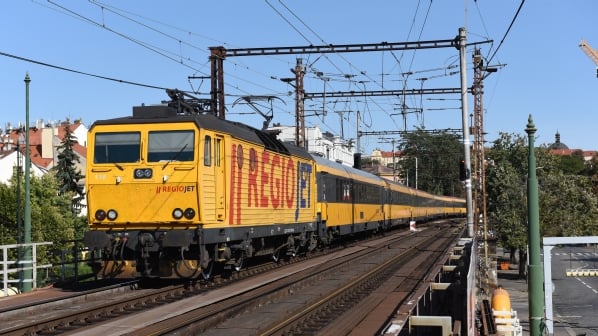THE European Commission (EC) has informed Austrian Federal Railways (ÖBB) and Czech Railways (ČD) of its preliminary finding that the two operators engaged in a “collective boycott” by agreeing to hinder access by Czech private operator RegioJet to ÖBB’s long-distance coaches between 2012 and 2016.
In its statement of objections on the companies’ alleged collective boycott, the EC says the action was designed to maintain the two operators’ market position and to impede the expansion of RegioJet in both the Czech Republic and on the Prague - Vienna route.
“To ensure that RegioJet could not acquire those wagons, ČD and ÖBB coordinated their actions in order to boycott RegioJet in sales of used ÖBB wagons,” the EC says.
A collective boycott occurs when a group of competitors agree to exclude or hinder an actual or potential competitor. The preliminary finding does not prejudge the outcome of the investigation, which began on June 28 2016 when the EC conducted unannounced inspections of the companies concerned.
If the EC’s preliminary view is confirmed, ÖBB and ČD’s conduct would infringe Article 101 of the Treaty on the Functioning of the European Union that prohibits anti-competitive business practices such as collusion. Ms Margrethe Vestager, executive vice-president at the EC, who is in charge of competition policy, says that the preliminary findings show that ÖBB and ČD restricted competition in the passenger rail market.
“With healthy competition, European citizens benefit from good quality and affordable rail passenger services,” she says. “Attractive rail passenger services also encourage travellers to shift from road to rail transport, which is essential for achieving the EU Green Deal's objectives.”
ÖBB told IRJ that it could not comment on the content of the allegations while EC proceedings were ongoing.
“It is important for us to note that we are interested in clarifying the case and are cooperating with the European Commission,” ÖBB says.
AllRail, which represents new entrants to the European rail market, says that access to second hand rail vehicles is one of the biggest barriers to market entry for new entrants and independent operators, in particular on cross-border open-access services. It says that there is no functioning market for second hand long-distance coaches currently under the ownership of the state incumbents that were originally purchased with the assistance of the taxpayer.
“AllRail has consistently argued that, in order to stimulate modal shift to rail, dominant players across Europe should be required to sell or rent their under-utilised second hand fleets to newcomers without preferential treatment for other market-dominant incumbents or unnecessary scrapping,” AllRail says.
“This announcement by DG COMP today gives the impression that cartel activity between state-owned rail incumbents takes place. It seems that ÖBB was willing to sell at a lower price to prevent a newcomer entering the market.”
AllRail goes on to argue that the lack of access to rolling stock could result in some member states claiming that there is market failure and that Public Service Obligation (PSO) contracts should be offered for these cross-border routes instead, contracts AllRail says the incumbent operators are well-placed to win.
“By withholding rolling stock, the incumbents are creating the conditions for their Member States to call for increased Public Service Obligations for which their incumbent will be the beneficiary,” AllRail says.

